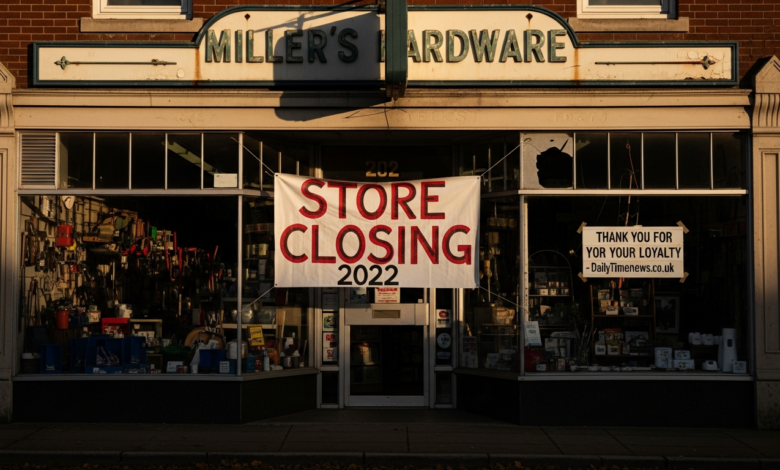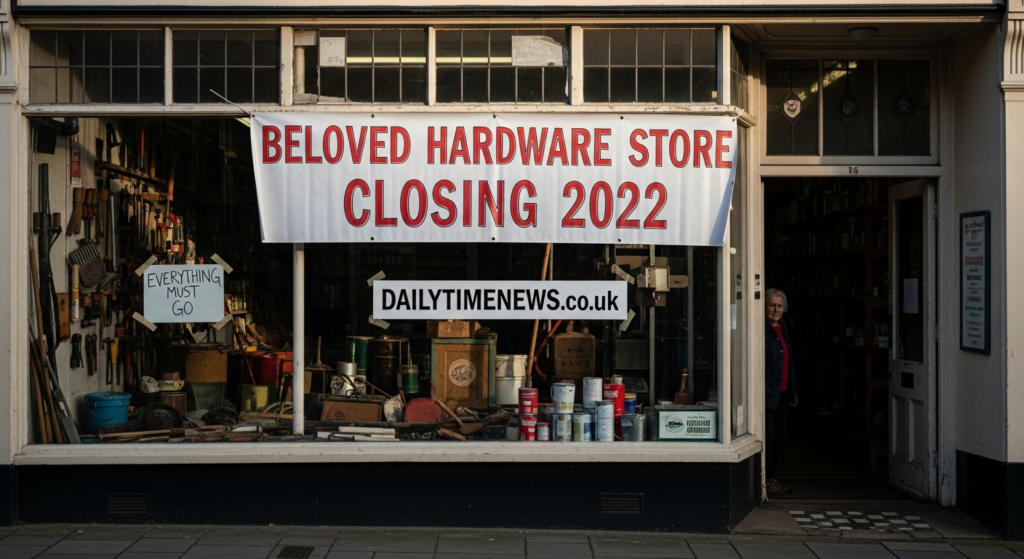Beloved Hardware Store Closing 2022: A Heartbreaking Loss

Introduction
You walk down Main Street, and something feels off. That familiar storefront where you bought your first hammer, where the owner knew your name, where advice came free with every purchase is now dark. Empty. A faded “Going Out of Business” sign still hangs in the window.
The beloved hardware store closing 2022 phenomenon wasn’t just about one shop. It was a nationwide trend that broke the hearts of communities everywhere. These weren’t just retail spaces. They were gathering places, problem solving hubs, and living pieces of local history.
Throughout 2022, dozens of independent hardware stores across America closed their doors for the final time. Each closure represented decades of service, generations of relationships, and irreplaceable local knowledge walking out the door. This article explores why these cherished businesses disappeared, what communities lost, and whether anything can fill the void they left behind.
The Wave of Hardware Store Closures in 2022
Understanding the Scale of Loss
The year 2022 saw an unprecedented number of independent hardware stores shut down permanently. Small towns and big cities alike watched their local fixtures disappear. The beloved hardware store closing 2022 stories shared common threads across the country.
Industry data showed that independent hardware retailers faced mounting pressures from multiple directions. Rising operational costs squeezed already thin profit margins. Supply chain disruptions made inventory management nearly impossible. Labor shortages meant stores couldn’t maintain adequate staffing levels.
Many of these closures involved businesses that had operated for 50, 75, or even 100 years. These weren’t failing businesses in the traditional sense. They were profitable operations that simply couldn’t compete in the changing retail landscape. The owners, often in their 60s or 70s, couldn’t find buyers willing to continue the legacy.
The emotional impact rippled through entire communities. Regular customers felt like they’d lost family members. Local contractors suddenly had to drive 30 minutes for basic supplies. Neighborhoods lost gathering places where people naturally connected.
Notable Closures That Made Headlines
Several beloved hardware store closing 2022 announcements captured national attention. Each story revealed the human cost behind retail statistics.
In Vermont, a 127 year old hardware store announced its closure in spring 2022. Five generations of the founding family had operated the business. The current owner, approaching retirement, couldn’t find a successor willing to take on the challenges of modern independent retail.
A California coastal town lost its hardware store after 83 years of continuous operation. The building’s landlord doubled the rent, making continued operation financially impossible. The community rallied with petitions and fundraisers, but economics prevailed over sentiment.
The Midwest saw multiple closures as aging owners retired without succession plans. One Iowa store’s closing meant the nearest hardware store was now 40 miles away. Rural residents suddenly faced serious challenges accessing basic supplies and services.
Each beloved hardware store closing 2022 represented not just lost retail space but vanished expertise. These store owners could identify any bolt, recommend the right tool for any job, and solve problems most big box employees never encountered.
Why Independent Hardware Stores Struggled in 2022
The Big Box Competition Factor
Large home improvement chains continued expanding their footprints throughout 2022. Every new Home Depot or Lowe’s location put pressure on independent stores within a 20 mile radius.
Big box stores offer advantages that small independents can’t match. Lower prices through massive buying power. Extended hours including weekends and evenings. Enormous inventory covering everything from lumber to appliances. These benefits attract customers even when they prefer shopping local.
The price gap between chain stores and independents widened during 2022’s inflationary period. When budgets tighten, customers gravitate toward the lowest prices. A beloved hardware store closing 2022 often cited inability to compete on price as a primary factor.
Big box stores also invested heavily in e-commerce and curbside pickup during the pandemic. These conveniences became expected features. Many independent stores lacked the resources to implement similar technologies.
However, the competition wasn’t entirely about price. Independent stores offered personalized service, expert advice, and community connection that chains couldn’t replicate. But apparently, these advantages weren’t enough to overcome the economic pressures.
Online Retail’s Growing Impact
Amazon and other online retailers fundamentally changed how people buy hardware and home improvement supplies. The convenience of doorstep delivery proved irresistible to many customers.
Specialty items that local stores couldn’t stock became instantly accessible online. Comparison shopping took seconds instead of driving store to store. Customer reviews provided information that once came from knowledgeable store employees.
The beloved hardware store closing 2022 trend accelerated as more customers shifted to online purchasing. Even loyal local shoppers occasionally bought online when prices differed significantly or when they needed something immediately unavailable locally.
Independent hardware stores tried competing online but faced massive disadvantages. They couldn’t afford the technology infrastructure. Shipping costs ate into already slim margins. Their inventory systems weren’t designed for e-commerce integration.
Some stores attempted hybrid models, maintaining physical locations while building online presences. Most found the investment unsustainable given their sales volumes and customer bases.
Real Estate and Operational Cost Pressures
Commercial real estate costs skyrocketed in many markets during 2022. Property owners facing their own financial pressures raised rents substantially. Hardware stores operating on thin margins couldn’t absorb these increases.
Many beloved hardware store closing 2022 announcements specifically cited rent increases as the final straw. Stores that had occupied the same building for decades suddenly faced lease renewals at double or triple previous rates.
Property taxes also increased in many jurisdictions. Utility costs rose with energy prices. Insurance premiums climbed. Wages needed to increase to attract workers in tight labor markets. All these factors compressed profitability.
Hardware inventory requires significant capital investment. Stores must stock thousands of SKUs to serve customer needs. This inventory ties up cash that could otherwise cover operational expenses. When sales declined even slightly, the inventory to sales ratio became unsustainable.
Building maintenance posed another challenge for older stores. Many operated from buildings needing significant updates. Electrical systems, HVAC, roofing, and accessibility modifications required substantial capital expenditures. Aging owners approaching retirement saw little logic in making these investments.
The Succession Planning Problem
Perhaps the most significant factor in beloved hardware store closing 2022 patterns was the lack of succession planning. Many stores were family businesses where children chose different career paths.
Running an independent hardware store is demanding work. Long hours, thin margins, and constant problem solving aren’t appealing to younger generations with more career options. The expertise required takes years to develop. You can’t simply hire someone off the street to run a hardware store successfully.
Some owners tried selling to employees or community members. Most found no interested buyers at prices that reflected the business’s value to the owner. The financial realities of independent hardware retail scared away potential purchasers.
Private equity and chain stores occasionally bought successful independents. But these acquisitions usually resulted in the store losing its independent character, the very quality that made it beloved. Customers got a different experience even though the storefront remained.
The generation that built many of these businesses in the 1950s through 1970s reached retirement age simultaneously. This created a wave of closures concentrated in a short period. 2022 represented a demographic cliff for independent hardware retail.

What Communities Lost When Hardware Stores Closed
More Than Just a Place to Buy Nails
A beloved hardware store closing 2022 meant communities lost far more than convenient access to hammers and paint. These stores served as community anchors with roles extending far beyond retail.
Hardware stores were information hubs. Contractors learned about job opportunities. Homeowners discovered reliable service providers. Neighbors shared recommendations and warnings. Bulletin boards displayed community announcements. These informal networks dissolved when stores closed.
The stores provided free advice and education. New homeowners learned basic maintenance and repair skills. DIY enthusiasts got guidance on ambitious projects. Kids discovered the satisfaction of fixing things instead of discarding them. This knowledge transfer disappeared with the stores.
Many hardware stores served as informal community centers. People lingered to chat with owners and other customers. Friendships formed in the aisles. The stores created third places where people naturally gathered outside of home and work.
Local economic impacts extended beyond the store itself. Hardware stores bought from local suppliers when possible. They employed local residents. They sponsored little league teams and community events. Their closure rippled through the entire local economy.
The Loss of Expertise and Personal Service
The expertise walking out the door when a beloved hardware store closing 2022 occurred was irreplaceable. Store owners and long time employees possessed deep knowledge accumulated over decades.
These experts could identify obscure parts, suggest creative solutions, and troubleshoot complex problems. They knew local building codes, understood regional climate challenges, and remembered what worked and what didn’t. This knowledge couldn’t be duplicated by online search or big box store employees.
Personal service meant store owners remembered your previous projects. They’d ask how that deck turned out or whether the plumbing repair held. They anticipated your needs based on your history. They’d special order items just for you even if they’d never stock them otherwise.
The relationship aspect mattered enormously. When you walked in, someone called you by name. They asked about your family. They offered sympathy when projects went wrong and celebrated when they succeeded. Shopping wasn’t just a transaction. It was a personal interaction.
Hardware store owners often served as community problem solvers. They’d loan tools to neighbors. They’d offer advice for free even when no purchase followed. They’d stay open late when someone had an emergency. This generosity and flexibility disappeared with closures.
Impact on Local Contractors and Tradespeople
Professional contractors relied heavily on independent hardware stores. The beloved hardware store closing 2022 wave created serious operational challenges for local tradespeople.
Contractors valued the ability to run in quickly for forgotten items or emergency replacements. They appreciated owner operated stores that opened early and stayed late. They needed the specialized knowledge to identify correct parts for older buildings and equipment.
Many contractors had accounts at local hardware stores allowing them to purchase supplies and pay monthly. This credit arrangement helped manage cash flow. Big box stores typically don’t offer similar programs to small contractors.
The personal relationships contractors built with hardware store owners provided competitive advantages. Store owners would set aside specific materials, call when expected items arrived, or hunt down rare components. These services helped contractors serve their own customers better.
When beloved hardware stores closed, contractors faced longer drive times, less specialized inventory, and more impersonal service. These inefficiencies increased project costs and reduced profitability. Some rural contractors faced particularly acute challenges when their nearest supply source moved 30 or 40 miles away.
Attempts to Save Beloved Hardware Stores
Community Campaigns and Fundraising Efforts
As beloved hardware store closing 2022 announcements spread, many communities organized to save their local stores. These grassroots efforts revealed how much these businesses meant to residents.
Social media campaigns encouraged shopping local and highlighted store importance. Petitions circulated gathering thousands of signatures. Community meetings brainstormed solutions. Local newspapers ran editorials praising the stores and urging support.
Some communities organized fundraisers to help stores cover debts or needed investments. Others negotiated with landlords to reduce rents. A few explored cooperative ownership models where community members would collectively own the business.
These efforts succeeded occasionally but usually failed. The underlying economics that threatened the stores couldn’t be overcome through goodwill alone. Emotional attachment and community support don’t pay rent or cover inventory costs.
The campaigns did demonstrate what communities valued. People recognized that some things matter beyond profit margins. The beloved hardware store closing 2022 stories sparked conversations about what makes communities functional and livable.
Transition to Employee or Community Ownership
A few threatened hardware stores transitioned to employee ownership or community cooperative models. These creative solutions kept stores operating under new structures.
Employee buyouts occurred when long time workers pooled resources to purchase the business. Sometimes combined with community investment or loans, this approach preserved institutional knowledge and continuity. Employees who’d worked alongside retiring owners could maintain the culture and expertise.
Cooperative ownership models invited community members to buy shares. These co-ops operated democratically with member owners participating in major decisions. The approach worked best in towns with strong cooperative traditions and significant community organization.
These transitions required substantial legal, financial, and organizational work. Not every community had the resources or expertise to execute them. The stores that successfully transitioned often became case studies and inspirations for others facing similar challenges.
However, these alternative ownership models couldn’t solve all problems. The economic pressures affecting independent hardware stores didn’t disappear. New owners still faced competition, rising costs, and changing consumer behaviors.
When Preservation Efforts Failed
Most beloved hardware store closing 2022 situations ended despite community efforts. The hard reality was that emotion couldn’t overcome economic forces.
Aging owners ready to retire couldn’t be convinced to continue working. Fair market value sales couldn’t be arranged. The capital required to modernize operations wasn’t available. Landlords wouldn’t negotiate reasonable leases. Suppliers demanded payment terms small stores couldn’t meet.
Some stores attempted final sales to clear inventory and generate cash to pay off debts. These events were bittersweet. Long time customers purchased sentimental items as keepsakes. The stores’ contents gradually disappeared, making the coming closure feel increasingly real.
Empty storefronts remained as painful reminders of what communities lost. Some buildings found new tenants quickly. Others sat vacant for months or years. A few were demolished for redevelopment. Each outcome felt like erasing community memory and character.
The grieving process paralleled losing a family member. Shock, denial, anger, and eventually acceptance followed. Communities moved forward but not without acknowledging what they’d lost. The beloved hardware store closing 2022 stories became part of local history and identity.
Life After the Hardware Store
How Communities Adapted
Communities that lost hardware stores found various ways to adapt. The adjustments weren’t easy and the replacements never quite matched what was lost.
Residents traveled farther for hardware supplies. The convenience of running down the street disappeared. Trips required more planning. People bought more per trip to reduce frequency. The spontaneity of quick errands vanished.
Online shopping increased dramatically after beloved hardware store closing 2022 events. People who’d resisted e-commerce reluctantly embraced it. The learning curve challenged older residents accustomed to in person shopping and personal assistance.
Some communities saw existing stores expand their hardware offerings. General stores, farm supply shops, or lumber yards added product lines to partially fill the gap. These weren’t complete replacements but provided some convenience.
Mobile tool libraries and equipment sharing programs emerged in some communities. These initiatives addressed access problems differently by emphasizing sharing over ownership. While not replacing hardware stores, they offered creative alternatives.
The Rise of Hardware Store Nostalgia
The beloved hardware store closing 2022 wave sparked significant nostalgia for traditional retail experiences. People shared memories on social media and in community conversations.
Younger generations who grew up accompanying parents to hardware stores reminisced about the distinctive smells, the wooden floors, the mysterious inventory. These sensory memories represented simpler times and closer communities.
The nostalgia extended beyond just hardware stores to encompass broader concerns about disappearing main streets. Hardware store closures symbolized larger losses of community character, local ownership, and neighborhood identity.
Some entrepreneurs recognized opportunities in this nostalgia. New concept hardware stores emphasizing old fashioned service, curated inventory, and community connection opened in select markets. These weren’t traditional hardware stores but rather experiential retail spaces trading on nostalgia.
Whether this nostalgia translates into changed shopping behaviors remains uncertain. People express values that don’t always align with their actions. Loving the idea of local hardware stores doesn’t necessarily mean shopping there when prices are higher.
Lessons for Other Small Retailers
What Hardware Store Closures Teach Us
The beloved hardware store closing 2022 phenomenon offers important lessons for all independent retailers facing competitive pressures.
Adapting to changing consumer preferences is essential. Stores that modernized point of sale systems, developed online presences, and offered delivery or curbside pickup fared better. Refusing to evolve guaranteed obsolescence.
Succession planning cannot wait until retirement looms. Identifying and training successors requires years. Stores that groomed next generation leadership had better chances of surviving ownership transitions.
Specialization offers advantages over trying to match big box breadth. Focusing on specific niches, whether premium tools, restoration supplies, or specialized trades, creates defensible market positions. Being everything to everyone guarantees being outcompeted.
Customer relationships remain independent retailers’ strongest advantages. The personal service, expertise, and community connection that hardware stores provided cannot be replicated by chains or online retailers. Investing in these differentiators makes economic sense.
Financial management must be rigorous. Thin margins require careful attention to inventory turns, operational efficiency, and cost control. Sentimental attachment to legacy practices or inventory cannot override financial realities.
Could These Closures Have Been Prevented?
Looking back at beloved hardware store closing 2022 cases, some failures seem inevitable while others might have been preventable with different choices.
Earlier adoption of technology might have helped some stores. Point of sale systems that integrated inventory management and enabled online ordering could have improved efficiency and reached new customers. The investment seemed expensive but might have ensured survival.
More aggressive pursuit of younger customers could have built bridges to next generations. Workshops, social media engagement, and marketing to homeowners rather than just contractors might have expanded customer bases.
Partnerships or cooperatives with other independent stores could have increased buying power and shared costs. Regional hardware store groups might have negotiated better terms with suppliers or jointly invested in technology.
Earlier succession planning would have prevented some closures. Identifying potential successors sooner and transitioning gradually might have preserved more businesses. The owners who waited too long found no good options remained.
However, some closures resulted from unstoppable forces. The economic advantages of big box retailers are real. Online shopping convenience genuinely serves customer needs. Commercial real estate costs reflect market conditions beyond store control. Not every closure could have been prevented regardless of decisions made.
The Future of Independent Hardware Retail
Can the Model Survive?
The question haunting independent hardware retail after the beloved hardware store closing 2022 wave is whether the model can survive long term.
Some industry observers argue that independent hardware stores are dinosaurs facing inevitable extinction. The economic advantages of scale, technology, and capital that chains possess are simply too great. Sentiment cannot overcome structural disadvantages indefinitely.
Others believe independents can survive by radically rethinking their model. Becoming highly specialized, fully embracing technology, or transforming into experience destinations rather than just retail spaces might create sustainable niches.
The stores most likely to survive serve markets where big box presence is limited. Rural areas, small towns, and unique urban neighborhoods might support independents if they adapt intelligently. Population density and competition levels matter enormously.
Successful future hardware stores probably won’t resemble traditional operations. They’ll integrate online and offline seamlessly. They’ll focus on services and expertise as much as products. They’ll create compelling reasons to choose them despite higher prices or limited inventory.
Emerging Models and Innovations
Some hardware retailers are experimenting with innovative approaches that might chart paths forward.
Hybrid online offline models allow customers to research online, get expert consultation by phone or video, and pick up orders curbside or via delivery. This combines convenience with expertise.
Membership or subscription models create recurring revenue and customer loyalty. Members get discounts, priority service, or exclusive access to workshops and events. This approach builds community while improving financial stability.
Tool libraries and rental programs reduce customers’ need to own everything while generating store revenue. Renting expensive tools used occasionally makes economic sense for customers and creates new business lines for stores.
Makerspaces and workshop facilities within hardware stores create destinations. People come for the community, education, and shared equipment. Product sales follow naturally as people work on projects.
Pop up stores or mobile units serve communities without permanent locations. These flexible approaches reduce overhead while maintaining presence in underserved areas.

Conclusion
The beloved hardware store closing 2022 stories represent more than business failures. They document the loss of community institutions that connected neighbors, preserved expertise, and anchored main streets.
These closures resulted from multiple pressures. Big box competition, online retail growth, rising operational costs, and succession planning failures all contributed. No single factor explains every closure, but the combined effect devastated independent hardware retail.
What communities lost extends far beyond convenient access to nails and paint. The expertise, relationships, and social connections these stores provided cannot be easily replaced. The empty storefronts remind us that some losses cannot be measured in purely economic terms.
Some independent hardware stores will survive by adapting and specializing. Others will close despite best efforts. The landscape of hardware retail has fundamentally changed. Going forward, fewer independent stores will serve communities in different ways than their predecessors.
The beloved hardware store closing 2022 phenomenon should prompt reflection about what we value in our communities. If we want local businesses, we must support them with our dollars and not just our sentiments. If we choose convenience and low prices above all else, we accept the consequences of those choices.
Did you lose a beloved hardware store in your community? What do you miss most about it? Share your memories and thoughts about what these closures mean for the places we call home.
FAQs
Why did so many hardware stores close in 2022? Multiple factors contributed including big box competition, online retail growth, rising operational costs, aging owners retiring without successors, and the cumulative effects of pandemic related disruptions to business operations and customer behaviors.
What happens to a town when its hardware store closes? Communities lose convenient access to supplies, expert advice, and a gathering place. Residents must travel farther for hardware needs. Contractors face operational challenges. The local economy suffers from lost employment, spending, and community investment.
Can anything replace a closed local hardware store? Big box stores, online retailers, and expanded offerings from other local businesses partially fill the gap. However, the personalized service, specialized expertise, and community connection are nearly impossible to replace fully.
Were hardware store closures preventable? Some closures might have been prevented through earlier technology adoption, better succession planning, or innovative business models. However, many closures resulted from economic forces beyond individual store control.
Do young people care about local hardware stores? Many younger people value local businesses and community connection but also prioritize convenience and price. Whether concern translates into shopping behavior that sustains independent stores remains uncertain.
What can communities do to support remaining hardware stores? Shop local when possible, pay fair prices without demanding big box pricing, spread positive word of mouth, participate in store events, and understand that support requires action not just sentiment.
Are any new independent hardware stores opening? Some entrepreneurs are opening new hardware stores using innovative models emphasizing expertise, experience, and community connection. These typically target underserved niches or markets rather than directly competing with chains.
How do hardware store closures affect property values? Closed storefronts can negatively impact nearby property values, especially when buildings remain vacant. However, successful redevelopment of former hardware stores into new businesses can maintain or improve values.
What’s the future of independent hardware retail? Independent hardware stores will likely continue but in smaller numbers and with different business models. Survivors will emphasize specialization, service, expertise, and community connection while embracing technology.
Where can I find a local hardware store near me? Search online for independent hardware stores in your area, ask contractors and neighbors for recommendations, and check community business directories. Independent stores exist but require more effort to locate than ubiquitous chains.
Also Read Dailytimenews.co.uk




